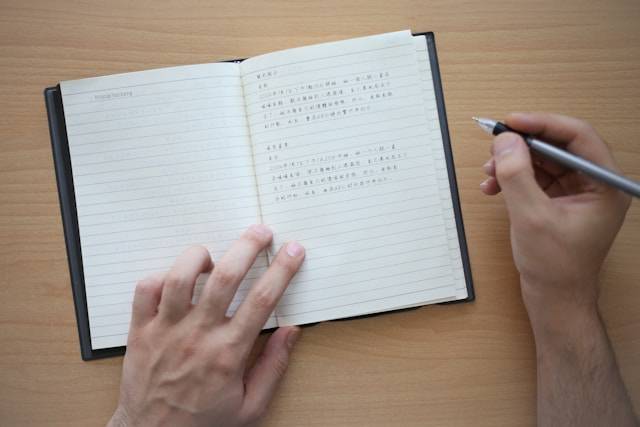
Journaling is a practice that has been cherished for centuries, offering a multitude of benefits for mental, emotional, and even physical well-being.
In today’s fast-paced world, finding moments of clarity and reflection can seem like a luxury. However, carving out time for daily journaling can benefit your mental, emotional, and even physical well-being. In this article, we’ll explore the transformative power of journaling and why making it a part of your daily routine is worth considering.
Table of Contents
1. Mental Clarity and Focus:
Journaling offers a space to declutter your mind, allowing you to articulate thoughts and ideas more clearly. By putting pen to paper (or fingers to keyboard), you can untangle the jumble of thoughts swirling in your head, leading to improved focus and concentration throughout the day.
2. Emotional Regulation and Stress Relief:
Expressive writing in a journal can serve as a form of therapy, helping you process emotions, reduce stress, and gain perspective on challenging situations. Externalizing your feelings onto the page creates distance from negative thoughts and emotions, leading to a greater sense of calm and well-being.
3. Goal Setting and Tracking:
A journal provides a structured platform for setting and tracking your goals. By writing down your aspirations, breaking them into actionable steps, and revisiting them regularly, you stay accountable and motivated to make progress toward your dreams.
4. Self-Discovery and Reflection:
Reflective journaling fosters self-awareness by prompting you to explore your values, beliefs, and motivations. By examining your thoughts and experiences on a deeper level, you gain valuable insights into who you are and what matters most to you.
5. Problem-Solving and Creativity:
When faced with challenges or creative blocks, journaling can serve as a powerful problem-solving tool. By brainstorming solutions, exploring different perspectives, and documenting your ideas, you unlock new pathways for innovation and growth.
6. Improved Communication Skills:
Writing regularly in a journal can enhance your communication skills by helping you organize your thoughts and articulate ideas more effectively. This clarity and precision in communication can translate to better relationships, both personally and professionally.
7. Memory Enhancement and Recall:
Documenting daily experiences and reflections in a journal can improve memory retention and recall. By capturing significant moments and insights on paper, you create a tangible record of your life journey, preserving memories for future reflection and learning.

8. Stress Reduction and Well-Being:
Engaging in regular journaling can lower cortisol levels and promote relaxation, leading to reduced stress and improved overall well-being. By expressing your thoughts and emotions in a safe and non-judgmental space, you cultivate a sense of inner peace and resilience.
9. Personal Growth and Development:
By documenting lessons learned, celebrating successes, and identifying areas for improvement, journaling facilitates continuous personal growth and development. Your journal becomes a repository of wisdom and growth, charting your evolution over time.
10. Time Capsule:
Your journal serves as a valuable record of your journey through life, preserving memories, insights, and experiences for future reflection and learning.
Why does Journaling matter?
Before delving into the tips and techniques, let’s quickly revisit why journaling is such a powerful practice. Journaling offers a space for self-expression, reflection, and growth. It allows you to declutter your mind, process your emotions, set goals, and track your progress. Moreover, journaling serves as a tool for self-discovery, helping you understand yourself better and navigate life’s challenges with clarity and resilience.
Tips for Productive Journaling
Set Aside Dedicated Time:
Treat journaling as a non-negotiable part of your daily routine. Whether it’s in the morning before starting your day or in the evening before winding down, choose a time that works best for you and stick to it.
Create a Welcoming Environment:
Find a quiet, comfortable space where you can journal without distractions. Consider setting the mood with calming music, lighting a candle, or surrounding yourself with inspiring objects.
Choose the Right Tools:
Select a journal that speaks to you, whether it’s a sleek notebook, a colorful bullet journal, or a digital journaling app. Experiment with different pens, markers, or digital styluses to find what feels most comfortable for you.
Start with a Prompt:
If you’re unsure where to begin, use journaling prompts to kickstart your writing. Prompts can range from simple questions like “How am I feeling today?” to more introspective prompts like “What are my biggest dreams and aspirations?”
Embrace Freewriting:
Allow your thoughts to flow freely onto the page without judgment or censorship. Don’t worry about grammar, spelling, or punctuation—just let your words spill out uncensored.
Experiment with Different Formats:
Journaling doesn’t have to be limited to traditional written entries. Try incorporating sketches, mind maps, or collages into your journal to add visual interest and variety to your practice.
Reflect and Review:
Take time to revisit your journal entries periodically. Reflect on your progress, insights, and growth over time. Use your journal as a tool for self-reflection and self-improvement.
Stay Consistent:
Like any habit, journaling requires consistency to yield meaningful results. Commit to showing up for yourself and your journaling practice, even on days when you don’t feel like it.
Techniques to Enhance Your Journaling Practice:
1. Gratitude Journaling:
Dedicate a section of your journal to gratitude journaling, where you write down things you’re grateful for each day. Cultivating an attitude of gratitude can shift your perspective and enhance your overall well-being.
2. Goal Setting:
Use your journal to set and track your goals, both short-term and long-term. Break down your goals into actionable steps and celebrate your progress along the way.
3. Morning Pages:
Start your day with a brain dump by writing three pages of stream-of-consciousness writing. This technique, popularized by Julia Cameron in her book “The Artist’s Way,” helps clear mental clutter and spark creativity.
4. Bullet Journaling:
Explore the bullet journaling method, a customizable organizational system that combines to-do lists, calendars, trackers, and more into one cohesive journal. Whether you’re a planner enthusiast or a minimalist, bullet journaling offers flexibility to suit your needs.
5. Reflective Journaling:
Set aside time at the end of each day to reflect on your experiences, challenges, and lessons learned. Ask yourself probing questions and write honestly about your thoughts and feelings.
The Bottom Line
Journaling is a deeply personal practice that can enrich every aspect of your life. By implementing the tips and techniques outlined in this guide, you can make your journaling sessions more productive, meaningful, and fulfilling. Whether you’re seeking clarity, inspiration, or simply a moment of self-reflection, your journal can serve as a faithful companion on your journey of personal growth and discovery. So grab your journal, unleash your creativity, and let the transformative power of journaling unfold in your life.
